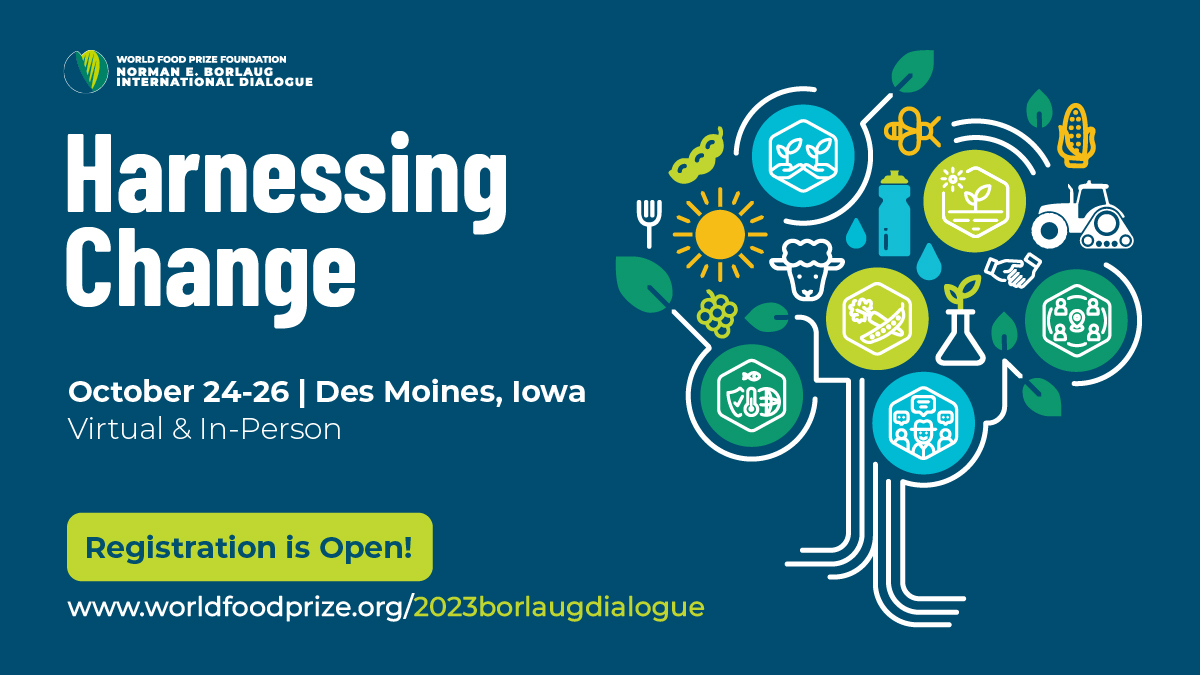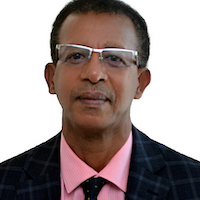24 - 26 October 2023. Norman Borlaug International Dialogue - harnessing innovation, adaptation, and diversification to improve systemic resilience, recover from shocks, and sustainably nourish all people. 16 - 20 October 2023. Virtual Side Events
The theme Harnessing Change is a deliberate progression of the 2022 theme, Feeding a Fragile World. After focusing last year on the ongoing impacts of COVID-19, climate change, and conflict, this year focused on harnessing innovation, adaptation, and diversification to improve systemic resilience, recover from shocks, and sustainably nourish all people.
- Resilience: How can we rebuild the food system to be more resilient to future shocks? A resilient food system is one that can absorb shocks, overcome stressors, and mitigate risk, all critical components of ensuring reliable food access for all. At the Borlaug Dialogue, we will discuss how different sectors can enhance resiliency at every level of the food supply chain.
- Innovation What innovations will tip the scale towards forward progress on hunger and malnutrition? Continuous innovation is critical to meet increasing food and nutrition demands amid crosscutting challenges like climate change, increased migration, and resource competition. Food system leaders are encouraged to harness Dr. Borlaug’s legacy of innovation and discuss and implement novel ideas to improve global food and nutrition security at the Borlaug Dialogue.
- Empowerment How can we empower future generations and those most vulnerable with the necessary tools and resources to become leaders in the food system? In order to harness change in food systems, all actors - farmers, businesses, universities, nonprofit organizations, governments, youth, and more - must be engaged and empowered to make change. Empowering individuals to embrace progress, deploy innovations, and think critically about the future of food and agriculture is a hallmark of the Borlaug Dialogue.
- Mobilization - How can we mobilize resources to implement solutions at scale? To decrease current and future levels of food insecurity, food system leaders must unite and mobilize resources to implement solutions at scale. The Borlaug Dialogue provides a space for diverse actors to come together to build effective solutions to the planet’s most intractable food and agricultural challenges.
- Nourishment - How can we center not only feeding but nourishing the planet, without leaving anyone behind? Properly nourishing the global population requires not just producing enough food, but also producing the right food to support good physical, cognitive, and societal health for all. With every country in the world facing the double burden of malnutrition, the Borlaug Dialogue encourages discourse that places increased attention on nutrition security and the acceptability, accessibility, and affordability of nutritious food.
- Regeneration - What role does regeneration play in a sustainable recovery? Regenerative approaches to the food system promote symbiotic relationships between agricultural and ecological systems, using context-specific knowledge to avoid or mitigate harm and replenish natural resources. The Borlaug Dialogue welcomes leadership in this area, recognizes its roots in Indigenous knowledge, and seeks to further explore its potential.
Extracts of the Agenda
16/10 Side event of the Borlaug Dialogue on Regenerative Agriculture
17/10 Multi-stakeholder action for scaling soil health globally for food security now and in the future
Healthy soil is the very foundation of our food systems and provides several vital ecosystem services, from carbon sequestration to improving food and nutrition security. Healthy soil is critical for supporting sustainable agricultural productivity growth and moving from scarcity to prosperity and healthy diets for all. With over one third of the Earth’s surface degraded and over 3.2 billion people negatively affected by degradation, continuing business as usual is no longer an option. Now is the time for multi-stakeholder action to build an enabling environment at multiple levels for supporting, financing, scaling and monitoring healthy soil ecosystems globally. The objectives of this session were to: 1) Raise awareness of the critical role of healthy soil for sustainable agricultural productivity growth, food and nutrition security, biodiversity, climate change mitigation and adaptation, and ecosystem restoration; 2) Showcase the goals, actions and progress of the Coalition of Action 4 Soil Health (CA4SH) and the Coalition for Sustainable Productivity Growth for Food Security and Resource Conservation; 3) Highlight progress on collaboration and partnership to scale and finance soil health.
- Dr. Leigh Winowiecki, Soil and Land Health Research Lead and co-Founder of the Coalition of Action 4 Soil Health (CA4SH)
- Dr. Elise Golan, Director for Sustainable Development for the US Department of Agriculture, and a co-Lead of the SPG Coalition
- Dr. Rattan Lal, Soil Scientist, Ohio State University, World Food Prize recipient 2020, co-Founder of CA4SH
- Dr. Joao Campari, WWF-International Food Practice Lead
- Adrian Leitoro, Youth Representative and Co-founder of Kenyan NGO Nature and People as One (NaPO)
- Kate Newbury-Hyde, Senior Manager, Agriculture and Food, World Business Council for Sustainable Development (WBCSD)
- Dr. Jack Hannam, Reader in Pedology, President of the British Society of Soil Science
18/10 Climate Action for Resilient Food System Transformation – Policy and Institutional Insights from Asia and Latin America and the Caribbean
Co-organized by IFPRI and Inter-American Institute for Cooperation on Agriculture (IICA)
- Suresh Babu, Senior Research Fellow / Head of Capacity Strengthening, IFPRI
19/10 Utilizing Adaptive Management to Harness Change
Land O'Lakes Venture 37 hosted a Borlaug Dialogue webinar on leveraging adaptive management to harness change, drawing on lessons from a Feed the Future pest management activity in the DRC.26/10 World Food Prize Africa Agriculture Dialogue
- Dr. Victor Oladokun, Senior Advisor to the President for Communication and Stakeholder Engagement, AfDB
- Dr. Akinwumi A. Adesina - President, AfDB
- H.E. Mrs. Sahle-Work Zewde, President of the Federal Democratic Republic of Ethiopia
- H.E. Kashim Shettima, Vice President of the Federal Republic of Nigeria
- Dr. Akinwumi A. Adesina - Tribute to Professor Gordon Conway, former President of the Rockefeller Foundatio
- Ramin Toloui, Assistant Secretary, Bureau of Economic and Business Affairs, U.S. Department of State
- Dina Esposito, Assistant to the Administrator for the Bureau for Resilience, Environment and Food Security, USAID
- John Coumantaros, Chairperson, Flour Mills of Nigeria (FMN)
- Stuart Knight, Global Commercial Operations Leader, Health and Agriculture, Thermo Fisher
- Jason Brantley, Vice President, Small Ag and Turf, John Deere
26/10 Without water, there is no food security
- Margaret Zeigler, IICA Representative of USA.
- Alvaro Lario, President of IFAD.
- Fernando Schwanke, IICA Project Director.
- Christopher Neale, Director of the Water for Agriculture Institute at the University of Nebraska. -
- Zulfikar Mustapha, Minister of Agriculture of Guyana.
26/10 Bringing Space to Place: Transforming African Agriculture with Better SOILS
Hosted by the International Fertilizer Development Center (IFDC).
SOILS-Space to Place (SOILS-S2P) is an innovative strategy for addressing global food security and soil health issues. Funded by the American people through the USAID Bureau for Resilience and Food Security, SOILS-S2P showcases a model of collaboration and forward-thinking approaches. The initiative collaborates with research- and development-minded public and private partners, including AGRA, CIMMYT, Kansas State University, and Ma’aden.
SOILS-S2P connects advanced technology, like GIS-based data, with local knowledge, empowering communities to make informed decisions regarding soil health and agricultural practices.
The remarkable results achieved, including yield increases of 40-200% and substantial reductions in fertilizer wastage, underscore this approach’s effectiveness.
Its potential for global scalability sets SOILS-S2P apart. The initiative demonstrates how we can collectively address multifaceted challenges from the impacts of crises, conflicts, and climate change, by fostering collaboration and implementing innovative solutions.
- Dr. Upendra Singh Vice President, Research International Fertilizer Development Center (IFDC)
- Dr. P.V. Vara Prasad
Distinguished Professor and Director, Feed the Future Sustainable Intensification Innovation Lab, Kansas State University
Feed the Future Sustainable
Intensification Innovation Lab, Kansas State University - Dr. Tilahun Amede Director of Sustainable Farming, Climate and Resilience AGRA
- Dr. Thomas G. Coon Professor Emeritus, Michigan State University Michigan State University
- Dr. Jonathan Atkinson The Meridian Group
- Dr. Bram Govaerts Director General of CIMMYT and 2014 Borlaug Field Award Laureate CIMMYT (International Maize and Wheat Improvement Center)
26/10 6:50 - 7:50pm CEST Food System Repercussions of the Russia-Ukraine War
- Lindiwe Majele Sibanda, Chair, CGIAR System Board
- Speaker from Ukraine's Ministry of Agrarian Policy and Food (Invited)
- Dina Esposito, Assistant to the Administrator for the Bureau for Resilience and Food Security (RFS) at USAID, Feed the Future Deputy Coordinator for Development, and Global Food Crisis Coordinator, and the Agency’s Global Food Crisis Coordinator - Mitigating the Global Impacts of Food System Shocks: Key Takeaways for Resilience Building Efforts
- Antonina Broyaka, Kansas State University, Department of Agricultural Economics - Outlook for Ukraine's Agricultural Sector
- Joseph Glauber, Senior Research Fellow, Market, Trade and Institutions, IFPRI - Impact of the War on Global Markets
- David Laborde, Division Director, Agrifood Economics Division (ESA), Food and Agriculture Organization (FAO) - How Domestic Policy Measures Exacerbate the Impact of the War
- Caitlin Welsh, Director, Global Food and Water Security Program, Center for Strategic and International Studies (CSIS) - Prevalence and Impact of Landmines on Ukrainian Agricultural Production\





No comments:
Post a Comment